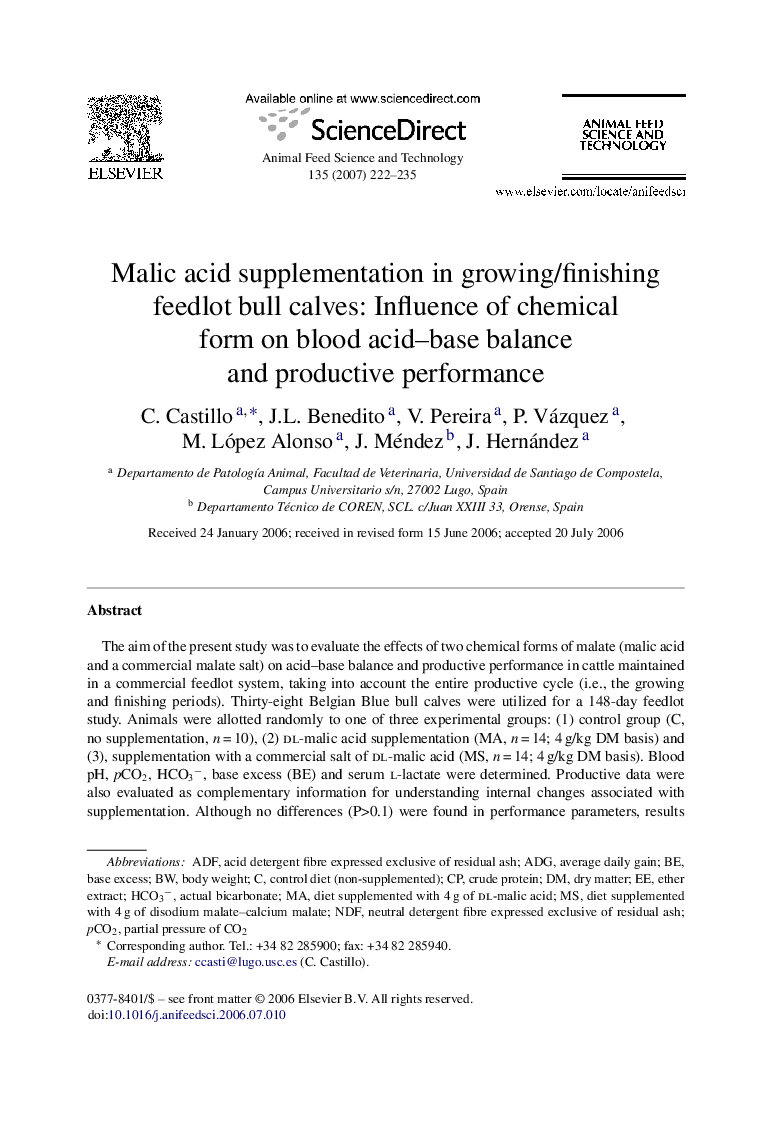| کد مقاله | کد نشریه | سال انتشار | مقاله انگلیسی | نسخه تمام متن |
|---|---|---|---|---|
| 2420896 | 1552484 | 2007 | 14 صفحه PDF | دانلود رایگان |
عنوان انگلیسی مقاله ISI
Malic acid supplementation in growing/finishing feedlot bull calves: Influence of chemical form on blood acid-base balance and productive performance
دانلود مقاله + سفارش ترجمه
دانلود مقاله ISI انگلیسی
رایگان برای ایرانیان
کلمات کلیدی
ADFpCO2ADGNDFHCO3− - HCO3-Malic acid - اسید مالیکacid detergent fibre expressed exclusive of residual ash - الیاف پاک کننده اسید بیانگر غلظت خاکستر باقی مانده استBase excess - بیش از حد پایهAcid–base balance - تعادل اسید-پایهether extract - عصاره اترpartial pressure of CO2 - فشار جزئی CO2neutral detergent fibre expressed exclusive of residual ash - فیبر مواد شوینده خنثی بیانگر انحصار خاکستر باقی مانده استdry matter - ماده خشکaverage daily gain - متوسط افزایش روزانهbody weight - وزن بدنcrude protein - پروتئین خامBeef cattle - گاو گوشت گاو
موضوعات مرتبط
علوم زیستی و بیوفناوری
علوم کشاورزی و بیولوژیک
علوم دامی و جانورشناسی
پیش نمایش صفحه اول مقاله

چکیده انگلیسی
The aim of the present study was to evaluate the effects of two chemical forms of malate (malic acid and a commercial malate salt) on acid-base balance and productive performance in cattle maintained in a commercial feedlot system, taking into account the entire productive cycle (i.e., the growing and finishing periods). Thirty-eight Belgian Blue bull calves were utilized for a 148-day feedlot study. Animals were allotted randomly to one of three experimental groups: (1) control group (C, no supplementation, n = 10), (2) dl-malic acid supplementation (MA, n = 14; 4 g/kg DM basis) and (3), supplementation with a commercial salt of dl-malic acid (MS, n = 14; 4 g/kg DM basis). Blood pH, pCO2, HCO3â, base excess (BE) and serum l-lactate were determined. Productive data were also evaluated as complementary information for understanding internal changes associated with supplementation. Although no differences (P>0.1) were found in performance parameters, results were numerically better for supplemented animals than for controls. The efficiency of the organic acid supplementation varies depending on its chemical form and on productive stage: while similar results were observed using the salt form or the free acid in the growing period, better results were obtained with the acid form in the finishing period. Looking at blood parameters, the malate salt seems to be more effective than the acid form due to the fact that the latter tended to decrease blood bases (although the possibility that the malate salt may cause blood alkalinization due to decreased pCO2 needs to be further explored). Finally, the effect of supplementation on blood l-lactate was shown (P<0.05) from the first week of the study: controls showed higher values than supplemented animals. In the growing period, differences were observed between C and MA steers, and between C and MS in the finishing period. In our opinion, there is a clear need for research evaluating the effects of organic acids on ruminant health in vivo.
ناشر
Database: Elsevier - ScienceDirect (ساینس دایرکت)
Journal: Animal Feed Science and Technology - Volume 135, Issues 3â4, 15 June 2007, Pages 222-235
Journal: Animal Feed Science and Technology - Volume 135, Issues 3â4, 15 June 2007, Pages 222-235
نویسندگان
C. Castillo, J.L. Benedito, V. Pereira, P. Vázquez, M. López Alonso, J. Méndez, J. Hernández,